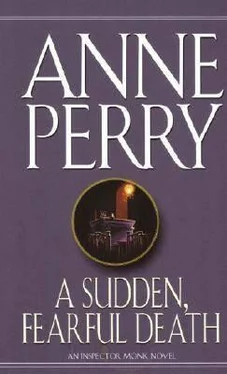After several moments he held up his hand.
"I understand-I will see him. There is no need to persuade me." Again he looked at her closely. "Is something troubling you, my dear? You are not at all yourself. Have we not trusted one another sufficiently that you can allow me to help?"
It was an open invitation, and she knew that by refusing she would not only close the door and make it harder to open again next time, but she would hurt him. His emotion was there in his eyes, and it should have made her heart sing.
Now she felt choked with unshed tears. All the loneliness of an uncounted span, long before her husband had died, times when he was brisk, full of his own concerns-not unkind, simply unable to bridge a gulf of difference between them-all the hunger for intimacy of the heart was wide and vulnerable within her.
"It's only the wretched business of the nurse," she said, looking down at the floor. "And the trial. I don't know what to think, and I am allowing it to trouble me more than I should… I am sorry. Please forgive me for burdening everyone else with it when we all have sufficient to bear for ourselves."
"Is that all?" he said curiously, his voice lifted a little in question.
"I was fond of her," she replied, looking up at him because that at least was totally true. "And she reminded me of a certain young woman I care about even more. I am just tired. I wiD be much better tomorrow." And she forced herself to smile, even though she felt it must look ghastly.
He smiled back, a sad, gentle look, and she was not sure whether he had believed anything she had said. One thing was certain, she could not possibly ask him about Marianne Gillespie. She could not bear to hear the answer.
She rose to her feet, backing toward the door.
"Thank you very much for accepting Mr. Burke. I was sure you would." And she reached for the door handle, gave him another brief, sickly smile, and escaped.
* * * * *
Sir Herbert turned the moment Rathbone came in the cell door. Seen from the floor of the courtroom at all but a few moments, he had looked well in command of himself, but closer to, in the hard daylight of the single, high window, he was haggard. The flesh of his face was puffy except around the eyes, where the shadows were dark, as if he had slept only fitfully and without ease. He was used to decisions of life or death, he was intimately acquainted with all the physical frailty of man and the extremity of pain and death. But he was also used to being in command; the one who took the actions, or refrained; the one who made the judgments on which someone else's fate was balanced. This time he was helpless. It was Rathbone who had control, not he, and it frightened him. It was in his eyes, in the way he moved his head, something even in the smell of the room.
Rathbone was used to reassuring people without actually promising anything. It was part of his profession. With Sir Herbert it was more difficult than usual. The accepted phrases and manners were ones with which he was only too familiar himself. And the cause for fear was real.
"It is not going well-is it?" Sir Herbert said without prevarication, his eyes intent on Rathbone's face. There was both hope and fear in him.
"It is early yet." Rathbone moderated, but he would not lie. "But it is true that we have so far made no serious inroads into his case."
"He cannot prove I killed her." There was the very faintest note of panic in Sir Herbert's voice. They both heard it. Sir Herbert blushed. "I didn't. This business of having a romantic liaison with her is preposterous. If you'd known the woman you would never have entertained the idea. She simply wasn't-wasn't remotely of that turn of mind. I don't know how to make it plainer."
"Can you think of another explanation of her letters?" Rathbone asked with no real hope.
"No! I can't. That is what is so frightening! It is like an absurd nightmare." His voice was rising with fear, growing sharper. Looking at his face, his eyes, Rathbone believed him entirely. He had spent years refining his judgment, staking his professional reputation upon it. Sir Herbert Stanhope was telling the truth. He had no idea what Prudence Barrymore had meant, and it was his very confusion and ignorance which frightened him most, the complete loss of reality, events he could neither understand nor control sweeping him along and threatening to carry him all the way to destruction.
"Could it be some sort of malicious joke?" Rathbone asked desperately. "People write strange things in their diaries. Could she be using your name to protect someone else?"
Sir Herbert looked startled, then a flicker of hope brightened his face. "I suppose it is conceivable, yes. But I have no idea whom. I wish to God I had! But why would she do such a thing? She was only writing to her sister. She cannot have expected the letters ever to be public."
"Her sister's husband, perhaps?" Rathbone suggested, knowing it was foolish even as the words were out.
"An affair with her sister's husband?" Sir Herbert was both shocked and skeptical.
"No," Rathbone replied patiently. "It is possible her sister's husband might read the letters. It is not unknown for a man to read his wife's letters."
"Oh!" Sir Herbert's face cleared. "Yes of course. That would be perfectly natural. I have done that from time to time myself. Yes-that is an explanation. Now you must find who the man is that she means. What about that man Monk? Can't he find him?" Then the moment's ease slipped away from him. "But there is so little time. Can you ask for an adjournment, a continuance, or whatever it is called?"
Rathbone did not answer.
"It gives me much more ammunition with which to question Mrs. Barker," he replied instead, then remembered with a chill that it was Faith Barker who had offered the letters to Monk in the conviction they would hang Sir Herbert. Whatever Prudence had meant, her sister was unaware of any secret the letters contained. He struggled to keep his disillusion from his face, and knew he failed.
"There is an explanation," Sir Herbert said desperately, his fists clenched, his powerful jaw gritted tight. "God damn it-I never had the slightest personal interest in the woman! Nor did I ever say anything which could…" Suddenly sheer, blind horror filled him. "Oh God!" He stared at Rathbone, terror in his eyes.
Rathbone waited, teetering on the edge of hope.
Sir Herbert swallowed. He tried to speak, but his lips were dry. He tried again.
"I praised her work! I praised it a great deal. Do you think she could have misinterpreted that as admiration for her person? I praised her often!" There was a fine sweat of fear on his lip and brow. "She was the finest nurse I ever had. She was intelligent, quick to learn, precise to obey, and yet not without initiative. She was always immaculately clean. She never complained of long hours, and she fought like a tiger to save a life." His eyes were fixed on Rathbone's. "But I swear before God, I never meant anything personal by my praise for her-simply what I said. No more, never more!" He put his head in his hands. "God preserve me from working with young women-young women of good family who expect and desire suitors."
Rathbone had a very powerful fear that he was going to get his wish-and be preserved from working with anyone at all-although he doubted God had anything to do with it.
"I will do everything I can," he said with a voice far firmer and more confident than he felt. "Keep your spirits high. There is very much more than a reasonable doubt, and your own manner is one of our strongest assets. Geoffrey Taunton is by no means clear, nor Miss Cuthbert-son. And there are other possibilities also-Kristian Beck, for one."
"Yes." Sir Herbert rose slowly, forcing himself to regain his composure. Years of ruthless self-discipline finally conquered his inner panic. "But reasonable doubt. Dear Heaven-that would ruin my career!"
Читать дальше












